ICNAN'19 Speakers
ICNAN 2019 aims to bring together Indian and International (scommunitiestudents, scientists, engineers and stakeholders from academia, government laboratories, industry and other organisations) working in the field of nanoscale science and technology to discuss new and exciting advances in the field.
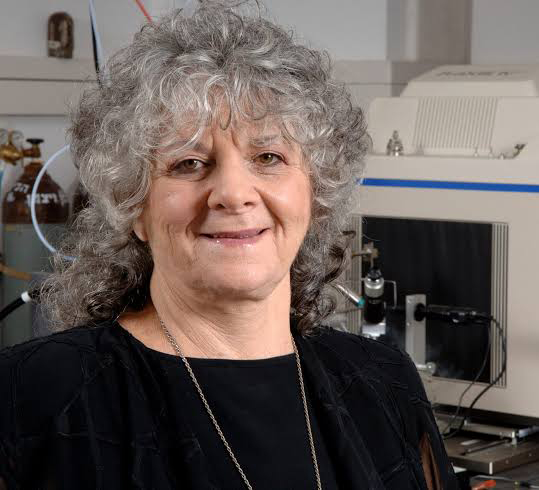
Dr. Ada E. Yonath
View More

Dr. Ada E Yonath
Weizmann Institute of Science, Israel
Ada E. Yonath is a crystallographer best known for her pioneering work on the structure of the ribosome. She is the current Director of the Helen and Milton A. Kimmelman Center for Biomolecular Structure and Assembly of the Weizmann Institute of Science, in Rehovot, Israel. In 2009, she received the Nobel Prize in Chemistry along with Venkatraman Ramakrishnan and Thomas A. Steitz, for her studies on the structure and function of the ribosome, becoming the first Israeli woman to win the Nobel Prize out of ten Israeli Nobel laureates, the first woman from the Middle East to win a Nobel prize in the sciences, and the first woman in 45 years to win the Nobel Prize for Chemistry.
In 2008, she became the first Israeli woman to win the L'Oréal-UNESCO Award for Women in Science for her vital work identifying how bacteria become resistant to antibiotics. She accepted postdoctoral positions at the Carnegie Mellon University (1969) and MIT (1970). She headed a Max-Planck Institute Research Unit at DESY in Hamburg, Germany (1986–2004) in parallel to her research activities at the Weizmann Institute.
She is a member of the United States National Academy of Sciences; the American Academy of Arts and Sciences; the Israel Academy of Sciences and Humanities; the European Academy of Sciences and Art and the European Molecular Biology Organization.
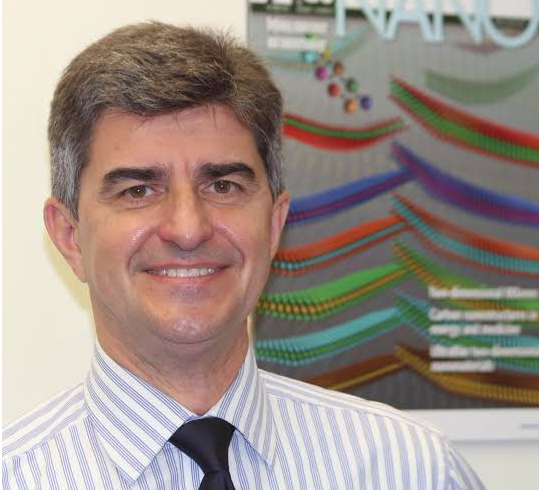
Dr. Yury Gogotsi
View More
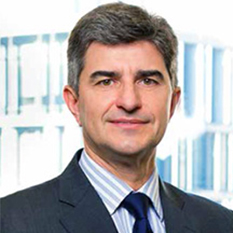
Dr. Yury Gogotsi
Drexel University, USA
Dr. Yury Gogotsi works on synthesis and surface modification of inorganic nanomaterials, such as nanodiamond, carbide-derived carbons, nanotubes, and two-dimensional carbides and nitrides (mxenes). His group also explores energy related and other applications of materials discovered and developed in gogotsi lab. He works on carbon and carbide nanomaterials with tunable structure and porosity had a major impact on the field of capacitive energy storage. His areas of study are materials science and engineering and nanomaterials
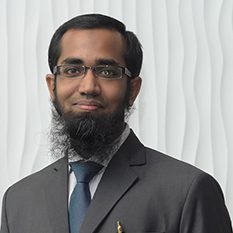
Dr. Abdul Khaliq Rasheed
View More

Dr. Abdul Khaliq Rasheed
Xiamen University, Malaysia
Dr Abdul Khaliq Rasheed is experienced in interdisciplinary research involving graphene, nanoscale heat transfer, nanotribology and bio-heat transfer. Since 2007, he has been involved in the production, characterisation and testing of advanced heat transfer fluids popularly known as nanofluids and nanolubricants. His PhD work on graphene-based nanolubricants is expected to be commercialised in Malaysia and other countries by 2018. He is currently working at the Research Centre for Nano-Materials and Energy Technology at Sunway University, where he designs and develops nanolubricants and nanofluids for automotive and renewable energy systems. Dr Rasheed is also involved in industrial consultancy, corporate social responsibility projects and tertiary/higher education consulting. He feels honoured to have been introduced to nanofluids and graphene by Professor Sarit Kumar Das at the Indian Institute of Technology Madras during 2007-2009.
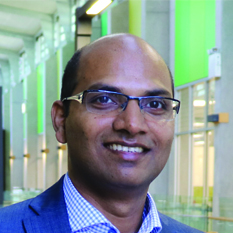
Dr. Ajayan Vinu
View More

Dr. Ajayan Vinu
University of Newcastle, Australia
A globally acclaimed material scientist and Australia’s leading nanotechnologist, Professor Ajayan Vinu is driven by a personal philosophy to give back and help others. Beginning with an undergraduate degree in Chemistry, he developed a determination to succeed from a young age. After completing a Masters in Chemistry with first class from Manonmanium Sundarnar University, Tamil Nadu, India, Professor Ajayan Vinu’s career continued to flourish, which he puts down to his determination. Impressing his supervisors, Professor Ajaya Vinu left India after obtaining a prestigious doctorate fellowship on immobilising biomolecules in a nanoporous system in Germany, going on to further respected positions in Japan and Australia, including International Young Scientist Fellow and Future Fellowship. Teaching himself many scientific principles, Professor Ajayan Vinu has honed his passion and experience working with nanomaterials, devoting his career to exploring their development, capabilities and applications in energy generation and storage, drug delivery, carbon capture and conversion, and catalysis. Just a couple of the projects under his leadership include utilising nanomaterials to convert carbon dioxide into clean fuel with only sunlight and water, value adding products through catalytic pathway, utilising nanoporous architectures for developing next generation energy storage and conversion devices, and the selective removal of cancer causing molecules. Now the Director of the University of Newcastle’s Global Innovative Centre for Advanced Nanomaterials, Professor Ajayan Vinu is leading the charge in translating basic materials research into real-world products. The centre has established a global research environment with a high standard of novel ideas for developing excellent advanced technologies for the betterment of society, specifically looking at energy, environment and health solutions. Thinking back to his roots, Professor Ajayan Vinu is focused on working to nurture the next generation of brilliant minds with a motto in mind – save the world and help the people.
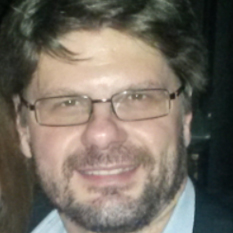
Dr. Andrea Floris
View More

Dr. Andrea Floris
University of Lincoln, UK
Dr Andrea Floris is a Senior Lecturer at the School of Chemistry at the University of Lincoln (United Kingdom). He is computational physicist with expertise on density functional theory (DFT), nanostructured systems, molecular self-assembly, vibrational properties and superconductivity. After obtaining his Ph.D. at the University of Cagliari (Italy), in 2004 he moved to Freie Universität Berlin (Germany), where he worked on the DFT for Superconductors (SCDFT), a theory able to predict the critical temperature of conventional superconductors in the absence of adjustable parameters. In 2007-2013, he was visiting researcher at the University of Minnesota (USA), where he extended the DFT+U method to the density functional perturbation theory, to calculate phonons spectra of strongly correlated materials. In 2010 he moved to King´s College London, where he started investigating molecular self-assembly and on-surface synthesis of organic molecules on metallic and insulating surfaces. During many years of research activity, he established collaborations with theoretical and experimental groups in Europe, UK, USA, China and India.

Dr. Adrian Ionescu
View More

Dr. Adrian Ionescu
University of Cambridge, UK
Dr Ionescu has received his Dipl. Phys. (M.Sc. in phyics) from the RWTH Aachen, Germany, in 2001 and his Ph.D. from Cambridge University, U.K. in 2006. His research interests span from spintronics, magnetic nanoparticles and qubits to magnetic biosensors and quantum biology. As the director of the Materials Growth Facility at the Cavendish Laboratory he has worked on a multitude of experimental, theoretical and computational projects with international academies and small, medium and large industrial partners such as Toshiba Research Europe Ltd or Hitachi Cambridge Laboratory. Earlier this year he has edited a monograph entitled “Magnetic Nanoparticles in Biosensing and Medicine” with Cambridge University Press, for newcomers to this research area, which provides a comprehensive insight into the fundamentals of magnetic biosensors and in which internationally renowned researchers showcase topics ranging from the basic physical principles of magnetism to the detection and manipulation, synthesis protocols and natural occurrence of magnetic nanoparticles.
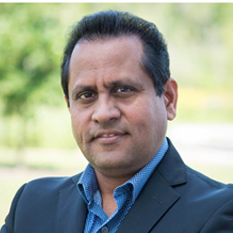
Dr. Anirudha V. Sumant
View More

Dr. Anirudha V. Sumant
Argonne National Laboratory, USA
Dr. Anirudha Sumant is a Materials Scientist at Center for Nanoscale Materials, Argonne National Laboratory and leading the research on nanocarbon materials including CVD-diamond, carbon nanotube, graphene as well as other 2D materials. He is a leading expert on energy-efficient systems based on nanocarbon materials. His recent work on demonstrating superlubricity (near zero friction) at engineering scale opened a new era in solid lubrication technology. He has more than 25 years of research experience in the synthesis, characterization and developing applications of carbon based materials. His main research interests include electronic, mechanical and tribological properties of carbon based materials and other 2D materials, surface chemistry, micro/ nano-scale tribology, and micro-nanofabrication. He is the author and co-author of more than 120 peer reviewed journal/proceedings publications, 2 book chapters, and has 26 granted patents, 15 pending. The list of his awards include four R&D 100 awards, NASA Tech Brief Magazine Award, and three TechConnect National Innovation Awards. He recently co-developed a nanotechnology educational kit “Next Gen STEM kit” for high school students in collaboration with United Scientific Supplies Inc. which is now available to high schools across the nation, that gives students first-hand nanofabrication experience right in the their classroom. He was recognized by Pinnacle of Education Award from Board of Governors of UChicago/Argonne LLC for this achievement. He has presented his research via numerous invited/keynote talks as well as through TEDx talk. His research in diamond and graphene materials helped in the formation of several start-up companies. He is a member of MRS, STLE and AVS.
Argonne web page: https://www.anl.gov/profile/anirudha-v-sumant
Research highlights and portfolio: https://www.anl.gov/novel-nanocarbon-materials
LinkedIn profile: http://www.linkedin.com/in/anisumant
Google scholar: http://scholar.google.com/citations?user=4dDO-10AAAAJ&hl=en&oi=ao
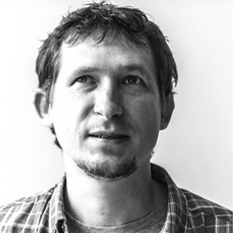
Dr. Artem Mishchenko
View More

Dr. Artem Mishchenko
University of Manchester, UK
Artem Mishchenko has interdisciplinary background and expertise in condensed matter physics, nanotechnology, electronics, nanoelectromechanical systems, and instrumentation development. The major contributions to these fields have been published in over 70 peer-referred papers, many in Science and Nature journals, leading to >10000 citations and h-index of 32. Areas of expertise condensed matter physics, nano electro mechanics molecular electronics instrumentation development He received the award from EMFL 2018 for his achievements in science done in high magnetic felid.
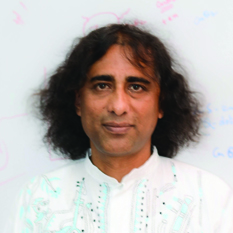
Dr. Arun Chattopadhyay
View More

Dr. Arun Chattopadhyay
IIT Guwahati, India
Dr. Arun Chattopadhyay has completed B.Sc Hons (Chemistry) at Presidency College, Calcutta University and M.Sc (Chemistry) at Indian Institute of Technology Kanpur. He had completed his M.Phil (Chemical Physics) and Ph.D (Chemical Physics) at Columbia University and finally completed Post. Doc. at Standford University. He interested in the broad areas of nanoscale science and technology involving synthesis, reaction and organization of nanoscale materials and their application in problems related to Chemistry and Biology. Particularly, working with composite materials, chemical locomotion and in nanobiotechnology, we lay stress on understanding the fundamental working principles of these novel materials. Honors received by Arun chattopadhyay were Fellow of Indian Academy of Sciences, Fellow of the Royal Society of Chemistry, Young Career Award in Nano Science and Technology (2013), DST (Nano Mission), Materials Research Society of India Medal – 2008, Swarna jayanti Fellowship (DST); 2003-2004, Elected a Member of Sigma Xi, The Scientific Research Society, Columbia University, 1992.
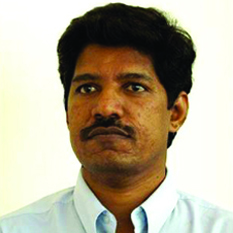
Dr. S. Balakumar
View More

Dr. S. Balakumar
University of Madras, India
Dr. S. Balakumar works as professor in University of Madras, India. His Specialization includes, Multifunctional Nanomaterials, Multiferroics nanomaterials, Metal Oxide Nanostructures for sensor and Photocatalytic application, Micro/Nanoelectronic Fabrication Processes, Cu-interconnects,Chemical Mechanical Planarization and Clean technology and Nanobioglasses for medical applications. He won several prestigious awards such as IME Team Excellence Award on Nanowires project in 2008, IME Long Term Service award in 2007 and Senior Fellow of the UNESCO-UNISA CHAIR in Nanosciences/Nanotechnology from 2014. He is a Member of several organizations like Life member in Indian Crystal Growth Association (Since 1993) Materials Research Society, India, Materials Research Society, USA, Electrochemical Society, USA (Since 2003), Member in International Research Club, A-Star, Singapore, IEEE Senior Member, Materials Research Society, Singapore and Nanosciences African Network.Dr. S. Balakumar has a Total Journals: 118 published.

Dr. Ben Buckley
View More

Dr. Ben Buckley
Loughborough University, UK
Dr Buckley completed his degree in Manchester working with Dr Julia Dickinson and Professor Ian J. S. Fairlamb on the synthesis of alpha pyrone mimics and then moved to Loughborough to carry out a PhD with Professor Philip C. B. Page in the area of organocatalytic asymmetric epoxidation. Following this Dr Buckley worked as a PDRA with Professor Philip. C. B. Page for a further year working on the synthesis of N-Heterocyclic carbene ligands with Dr Steven D. R. Christie. In 2004 he was appointed as a university research fellow, working on projects with DSM (Netherlands), Prof. Harry Heaney, Prof. Graham Hutchings FRS (Cardiff University), and Prof. Frank Marken (Bath University). In September 2007 he was appointed as a Research Councils UK Fellow, in September 2012 to a permanent Lectureship and in March 2014 he was promoted to Senior Lecturer in Organic Chemistry.
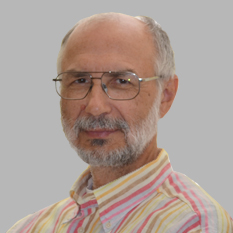
Dr. Bruno D’Aguanno
View More

Dr. Bruno D’Aguanno
Vellore Institute of Technology, India
Bruno D'Aguanno is a physicist, and his current research interests include the development of models and algorithms for the design of: (i) nano structured materials (carbon foam, nanofluids and polymeric membranes), (ii) innovative systems for energy storage (thermal and compressed air energy storage), (iii) PEM and regenerative Fuel Cells, as well as (iv) heliostat fields for competitive concentrated solar power applications. At the moment, he is professor at the Center for Nanotechnology Research (CNR) of the Vellore Institute of Technology, Vellore, and he is acting as expert advisor for the Solar Energy Research Center, Southeast University, Nanjing, China. Prior to, he was the Scientific Director of the CIC Energigune, Spain, the Director of the Renewable Energy Program of Crs4, Italy, temporary assistant professor at the Physics Department of the Konstanz University, Germany, and Scientific Employee at the Condensed Matter Department of the Free University of Berlin, Germany. He is the author of scientific monographs, review and research papers, and he is very active in promoting European research projects and renewable energy scenarios for a better life.
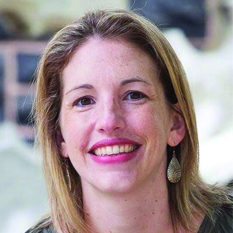
Dr. Carla Melendandri
View More

Dr. Carla Melendandri
University of Otago, New Zealand
Dr Carla Meledandri is a Lecturer in the Department of Chemistry at the University of Otago. Her research is focused on the design, synthesis and characterisation of functional nanoscale and nanocomposite materials, and the investigation of their efficacy for applications in the area of biomedicine; specifically, for improved medical diagnosis and targeted therapy, particularly dental therapy. In 2001 Carla received her B.S. degree in Chemistry from Penn State University. From 2002 – 2004, she worked as a Research Associate in the Department of Blood Research at the Walter Reed Army Institute of Research in Maryland, where her work involved the investigation of membrane lipid and protein interactions with novel cryo protecting agents. She then carried out her PhD study from 2004 – 2008 at Dublin City University, where her work involved the preparation and fast field-cycling NMR characterisation of membrane-bound nanoparticles and nanoparticle assemblies for biomedical applications. After completing a post-doctoral assignment (2008 – 2009) at the same University, where she worked on the development of hierarchical assemblies of hybrid magnetic nanoparticle clusters for applications in magnetic resonance imaging, Carla moved to New Zealand and began her current appointment at Otago in December 2009. Carla has been an Associate Investigator in the MacDiarmid Institute since 2010. Research Interests Our research is directed toward the design, synthesis, and characterization of functional nanoscale materials. The interest in nanoscale materials lies in the fact that their size, shape, and composition can dramatically affect their physical and chemical properties. This phenomenon can be exploited in order to develop new materials with tunable properties for a broad range of applications. Our interests encompass both fundamental and applied aspects of nanomaterials research. Current projects are interdisciplinary, combining chemistry, materials science, physics, and biological sciences in order to develop new materials with potential application in biomedicine and for use as nanoswitches.
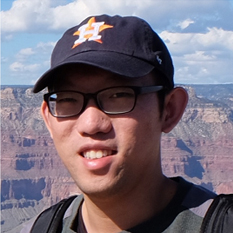
Dr. Chien-Hung (Henry) Li
View More

Dr. Chien-Hung (Henry) Li
Kaohsiung Medical University, Taiwan
Henry Li was born in Taipei, Taiwan. He received his B.S. degree in Chemistry from National Dong Hwa University, Taiwan in 2008. After one year of military service, he has joined into Prof. T. Randall Lee's group at University of Houston, USA and received his Ph.D. in 2015. His PhD research works were mainly focused on the developments of photonic nanomaterials for various applications. In 2016, he had joined into Prof. Cathleen Crudden's group at Queen's University, Canada as a postdoctoral researcher and worked on self-assembled monolayer of N-heterocyclic carbenes on Au surfaces and nanoparticles for multiple applications. In 2018, he came back to Taiwan and joined as an assistant professor in the Department of Medicinal and Applied Chemistry at Kaohsiung Medical University, Kaohsiung City, Taiwan. His current research focuses on the developments of organic molecules functionalized photonic nanomaterials in biomedical and energy applications.

Dr. Daniel Thangadurai
View More

Dr. Daniel Thangadurai
Sri Ramakrishna Engineering College, India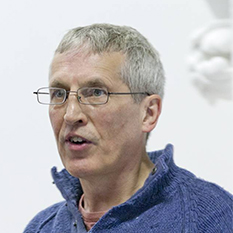
Dr. David Jenkins
View More

Dr. David Jenkins
Plymouth University, UK
Dr. David Jenkins has completed, B.Sc. Physics, M.Sc. Laser Physics, Ph.D. Applied Physics and post doctoral fellowship from Manchester University. He has Professional membership on Institute of Physics, MInst p., C.Phys.Institute of Engineering and Technology M.IET Research interests Micro Sensor / Actuator Systems: Surface Plasmon Resonance and Nano toxicology, Functional materials and Micro-electro mechanical devices (MEMS), Graphene and Sensors and Active vibration control. Microscopy: Magnetic Force Microscopy (MFM), Electro Magnetic Force Microscopy (eMFM), Near-field optics, scanning laser microscopy. Medical Systems: Laser interactions with DNA and cells and Heart Rate Monitoring.
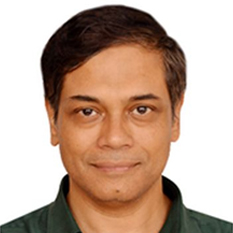
Dr. Debabrata Goswami
View More

Dr. Debabrata Goswami
IIT Kanpur, India
Prof. Debabrata Goswami is a Senior Professor at Indian Institute of Technology Kanpur (IITK) and holds the endowed Prof. S. Sampath Chair Professor of Chemistry. He is also Adjunct Professor at three centres of IITK, namely, Center for Lasers and Photonics, The Design Program and the Center for Cognitive Science. His research work spans across frontiers of interdisciplinary research with femtosecond lasers that have been recognised globally, the latest being the 2018 Galileo Galilei Award of the International Commission of Optics (ICO). As a part of his doctoral thesis at Princeton, Prof. Goswami had developed the first acousto-optic modulated ultrafast pulse shaper, wherein the 2018 Physics Nobel Prize winner, Prof. Strickland, also participated as a post-doctoral fellow at that time in the same laboratory. As a part of his independent research, Prof. Goswami was the first to propose that the phase of a laser pulse may be critical in quantum computing. One of the latest thrusts in quantum information processing and computing relies heavily on scalability and near room temperature techniques wherein Dr. Goswami’s unique optical approaches stands at the forefront. He works at the frontiers of interdisciplinary research embodying theoretical and experimental developments in the fundamental aspects of femtosecond laser-matter interactions. Use of optical approaches to exert and control spatiotemporally has been the mainstay of his research development towards scalable quantum computing systems. The fallouts of this technology-heavy research have been many, which include superresolution microscopy, coherent control of chemical reactions, self-calibrated femtosecond optical tweezers (SCFOT), and thermal lens spectroscopy—all of which are being explored diligently in his lab. His novel SCFOT can directly probe colloidal assembly, their structure and orientation. The same method has been applied to provide a direct measure and control of 'in situ' temperature and viscosity at microscale volumes.
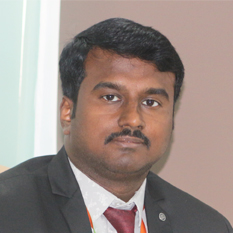
Dr. Deepak A.
View More

Dr. Deepak A.
Saveetha University, India
Dr. A. Deepak, is Currently working as Associate Dean – International Affairs, Saveetha School of Engineering, Saveetha Institute of Medical and Technical Sciences. His current area of research includes nano electronics, nano sensors, Graphene and Carbonnanotube based thin flims and Graphene based transistors for biomedical applications. To his credentials he has visited various universities in UK and other countries. He has carried out his Post-doctoral research work in the University of Plymouth. He has more than 30 publications to his credentials. He is the author of 2 book chapters and filled 2 patents. He played a major role in signing MOU with more than 30 universities in abroad for his host institution. He has also received many awards for his contributions in both academics and research.

Dr. Dinko Chakarov
View More

Dr. Dinko Chakarov
Chalmers University of Technology, Sweden
Dinko Chakarov was Undergraduated from University: Sofia University, Bulgaria, Area: Engineering Physics. He Graduated as Research engineer at Metallurgy Industries Kremikovci (1980-1983)Graduate student Bulgarian Academy of Sciences, IGIC, Sofia. Area: Surface Science- PhD Thesis: “Interaction of CO, H2 and CH4 with Iridium Surfaces Studied by Electron Spectroscopy Methods". Time period 1983-1989, Degree: PhD Post-doc University(ies)/Department(s): 1. Lab. Atomic Solid State Physics, Cornell U., USA, Prof. Wilson Ho, Area: Surface Science, Time period: 1989 – 1991. 2. Surface Science Group, Chalmers/GU, Sweden, Prof. Bengt Kasemo, Area: Surface Science, Time period: 1991 – 1993. Appointments: Present: Professor of Physics, Dep. of Applied Physics, Chalmers; 2005: Associate Professor (Docent), Dep. of Applied Physics, Chalmers; 1995: Lecturer, Department of Applied Physics, Chalmers/Göteborg University; 1993: Researcher, Department of Physics, Chalmers/Göteborg University. C: Tutoring experience: Main supervisor of 7 PhD, 11 Licenciate, 12 PostDocs and 30(+) Master, Bachelor and high school students. Co-supervisor of 8 PhD and 4 Licenciate students. Teaching experience and qualifications: Teaching on graduate and undergraduate levels. Received training in Pedagogical (GU 1995), PhD Supervision (GU 2004, Chalmers 2010) and Scientific Leadership (Chalmers 2006/7) courses.
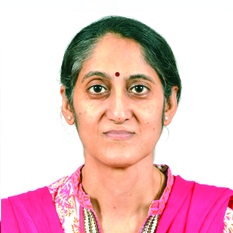
Dr. Gargi Raina
View More

Dr. Gargi Raina
Vellore Institute of Technology, India
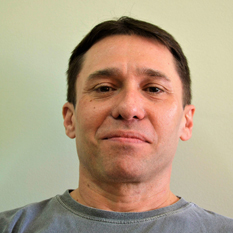
Dr. Gilberto Maia
View More

Dr. Gilberto Maia
UFMS, Brazil
Gilberto Maia is a Full Professor at Universidade Federal de Mato Grosso do Sul – Brazil - Institute of Chemistry and has been conducting research particularly on nanostructured metal electrocatalysts (supported on carbon-based materials or otherwise) for use in the oxygen reduction reaction (ORR), yielding water or hydrogen peroxide, hydrogen evolution reaction (HER), and oxygen evolution reaction (OER); synthesis of graphene and graphene oxides, including their application to ORR; inorganic complexes applied to HER; enzymatic bioelectrocatalysts; and density functional theory for metallic surfaces (supported on carbon-based materials or otherwise) to be used in electrocatalysis.
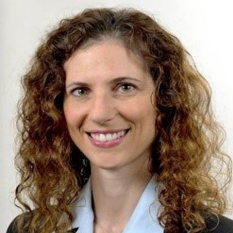
Dr. Giorgia Pastorin
View More

Dr. Giorgia Pastorin
NUS, Singapore
Giorgia Pastorin received her MSc degree in Pharmaceutical Chemistry and Technology in 2000 and her Ph.D. in 2004 from the University of Trieste (Italy). She spent two years of her postDoc at the CNRS in Strasbourg (France), where she specialized on drug delivery. She joined the National University of Singapore in June 2006, as Assistant Professor in the Department of Pharmacy-Faculty of Science. She was promoted to Associate Professor in 2011, Assistant Head in 2014 and Deputy Head in 2016; she is currently Assistant Dean (Research) at the Faculty of Science and Director of the Pharmaceutical Innovation and Research Center in NUS. She is the Editor of two books related to drug delivery and author in more than 120 articles on internationally peer-reviewed journals including Nature Nanotechnology, Biomaterials, Angewandte etc. For the work performed by her BioNano-Technology group in NUS, she received the Young Scientist Award (2015).
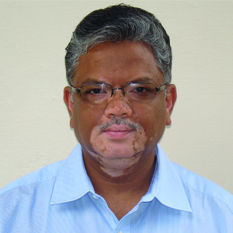
Dr. Gridhar U. Kulkarni
View More

Dr. Gridhar U. Kulkarni
CeNS, India
Dr. G. U. Kulkarni is a Professor, Chemistry and Physics of Materials Unit, JNCASR and Director at CeNS, Bangalore. He received his PhD at Indian Institute of Science in 1992 and has held visiting/adjunct positions at Cardiff, Tokyo, TASC-INFM, Trieste; Scuola Normale Superiore, Pisa; Purdue etc. His present research interests are focused on new strategies in synthesis of nanomaterials, nanopatterning and nanodevice fabrication including of molecular systems. His recipes emphasize the importance of simple design, near ambient working conditions, solution based processing as well as low cost instrumentation. His group strives to translate nanoresearch finding into affordable technology. Prof. Kulkarni’s pages at JNC: http://www.jncasr.ac.in/kulkarni/
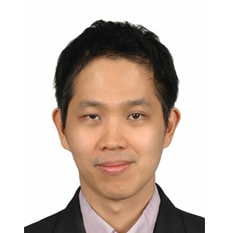
Dr. Huang Nay Ming
View More

Dr. Huang Nay Ming
Xiamen University, Malaysia
Huang is a Professor at the Faculty of Engineering, Xiamen University Malaysia since April 2017. Previously, he served University of Malaya as an Assistant Professor from 2009-2017. Huang’s research interest is fabrication of graphene and graphene-based nanocomposites. Huang applies these graphene nanomaterials in the fields of sensors, solar energy conversion and electrical energy storage. Currently he is focusing on using various graphene materials for electrical energy storage in different systems such as supercapacitors, lithium ion batteries and aluminium ion battery. Since 2009, his research is funded by the Ministry of Higher Education, MOHE and the Ministry of Science Technology and Innovation Malaysia, MOSTI (eScience fund, National Nanotechnology Development), with a total grant of RM 2.7 millions. Through his works on graphene and nanomaterials, Huang was awarded the National Young Scientist 2012 Award by the Ministry of Science Technology and Innovation Malaysia, MASS Young Scientist 2012 Award by the Malaysia Association of Solid States, UM Young Researcher 2012 Award by University of Malaya and Malaysia Rising Star Award by MOHE 2016.
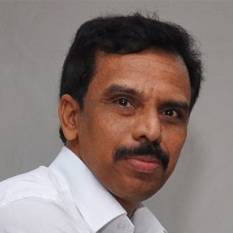
Dr. R. Ilangovan
View More

Dr. R. Ilangovan
University of Madras, India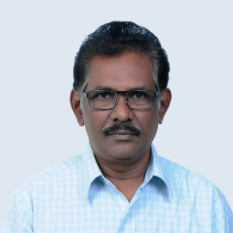
Dr. M. Jayabalan
View More

Dr. M. Jayabalan
Sree Chitra Tirunal Institute, India
Dr. M. Jayabalan has worked as Scientist-G & Head of Polymer Science Division for 33 years in Sree Chitra Tirunal Institute for medical Sciences and Technology (SCTIMST), Thiruvananthapuram, India. He received M.Sc (1975-77), Ph.D (1978-1981) and D.Sc (2009) degrees in Analytical Chemistry from University of Madras. He has also specialized in Intellectual Property Rights Law (2006) (National Law School of India University, Bangalore). During his career, he has involved in Research and development on biomaterials, medical devices and implants. His major research interests are high performance biostable polymers, biodegradable implantable polymers and nanomaterials, tissue engineering (orthopedic and cardiac) and theranostic biomaterials for imaging and targeted drug delivery. He has taught chemistry at graduate and post graduate level and biomaterials at M.Phil and Ph.D programmes. As a Principal Investigator, he has executed 10 Industry-sponsored and multidisciplinary research projects funded by DBT, DST and SCTIMST (Government of India) and DST-BMBF (Germany) with national and international collaboration in biomaterials. He has collaborated with Hacetepe University, Ankara, Turkey (TWAS Fellowship) and University of Duisburg, Essen, Germany (DST-BMBF scheme) as Visiting Scientist. He has transferred 3 technologies and filed 15 patents for the products developed in biomaterials. He has guided 27 students for Ph.D, M.Phil and post graduate degrees, published more than 175 research papers in international journals and conferences. He has edited book on ‘Biomedical Materials and Devices - New Frontiers’ and "Consumer Plastics and Ecological Safety". He is the Guest Editor for J. Materials Science-Materials in Medicine (spl issue IUMRS-ICAM 2007). He is a Member, International Editor Board, Int. J. Polymer Materials, Turkish J. Biomaterial Science and Technology (1995), J.Clinical Rehabilitative Tissue Engineering Research (2009-2012) and Hacettepe J. Biology and Chemistry and reviewer of several international journals. Dr. Jayabalan is a life member of professional societies, Society for Biomaterials and Artificials Organs, Society of Toxicology of India, Materials Research Society of India and Society of Polymer Science of India and Member of Materials Research Society (Singapore). He has executed various responsibilities such as Treasurer of Society for Biomaterials and Artificial Organs and MACRO-2004, Secretary of Society of Polymer Science of India - Trivandrum Chapter, Chairman of Biomaterials Subject Group of Materials Research Society of India and Chairman of Materials Research Society of India-Trivandrum Chapter. He has organsied major international and national events in the biomaterials science and polymer science. He, as Conference Chair, has organsied - Theme symposium 'Materials for Biomedical Applications' in IUMRS-ICAM 2007. Dr. M. Jayabalan is a member of Scientific Advisory Committee of National Centre for Technology on Family Welfare. He has received MRSI Medal (Materials research Society, India), Thangam Vasudevan Award (Indian Association of Biomedical Scientists). He is coauthor of 3 best paper awards from various conferences. He has received Fellowship from Third World Academy of Sciences. He is Fellow of Indian Association of Biomedical Scientists.
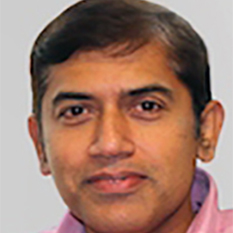
Dr. Jayan Thomas
View More

Dr. Jayan Thomas
University of Central Florida, USA
Dr. Jayan Thomas, works as Associate Professor in University of Central Florida, USA. He completed his Postdoctoral fellowship in International School of Photonics, India. He served as Research Scientist, College of Optical Sciences, The University of Arizona during 2001-2005. Research in Dr. Jayan Thomas group is focused on developing nanoarchitectured energy conversion and storage devices. Recently, their group have developed a nanoarchitecturing technique using which polymer nanostructures can be printed efficiently at low cost. This technique is utilized to develop nanostructured polymer solar cells, nanoarchitectured electrodes for Li-ion batteries and supercapacitors, and printed biomolecule based photonic devices. Their nanoimprinting technique offers a simple route to fabricate large area nanostructures in a very short time. Another line of work is the development of photorefractive polymers with improved sensitivity. Photorefractive composites derived from conducting polymers offer the advantage of dynamically recorded holograms without the need of processing of any kind. Thus, they are the material of choice for many cutting edge applications, such as updatable three-dimensional (3D) displays and 3D telepresence. Further improvements in the polymer composites could bring applications in telemedicine, advertising, updatable 3D maps and entertainment. We are also working on the development of new photorefractive polymers sensitive at IR wavelengths. The group is also studying the optical limiting properties of core-shell plasmonic nanostructures. He won several prestigious awards, honors and societites such as Reach for the stars Award in 2016, R&D100 Award in 2015 and NSF CAREER award in 2014.
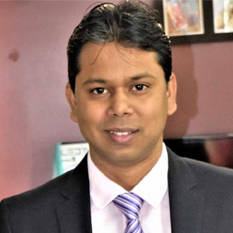
Dr. Jayashankar Das
View More

Dr. Jayashankar Das
Gujarat Biotechnology Research Centre, India
Dr. Das is a young and dynamic technocrat and researcher dedicated himself towards the development of an ecosystem of Science and Technology with strong Academia-Industry linkages. In his early career, he was a goldmedalist in Masters in Biotechnology and also recipient of honorary gold medal from former president Dr. A.P.J. Abdul Kalam in excellence in Biotechnology. He received his PhD in Biotechnology and served as a Scientist at IBSD, DBT, Govt. of India and initiated various research programs on high altitude biotechnology, metabolic engineering and synthesis of nano particles. He was the founder and CEO of a business portfolio named “Valnizen” which deals with regulatory documents and healthcare compliances and support services to African and southeast Asian countries. He was heading the Bioinformatics and environmental Sector for the state as Joint Director to Gujarat State Biotechnology Mission (GSBTM), DST, Govt. of Gujarat. He is actively involved in development of various policies like Biotechnology policy, Innovation policy, Interpole disaster management policy, start up policy. Last but not the least he has been member in advisory and governing bodies of many Universities, Institutions and Govt. departments including many startup companies. Currently, he is associated with Gujarat Biotechnology Research Centre, DST as a Joint Director and involved in research on frontier areas of Biotechnology for tackling societal challenges of the region. His research team is involved in many projects viz. development of rapid and onsite diagnostics for infectious diseases, development of vaccine, development of miRNA based targeted therapeutics, novel recombinant enzymes for industrial challenges, etc.
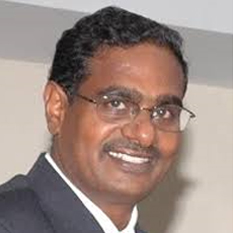
Dr. R. Jayavel
View More

Dr. R. Jayavel
Anna University, India
Dr. R. Jayavel, Coordinator, Centre for Nanoscience & Technology and Professor, Crystal Growth Centre, Anna University is having 28 years of research experience in Materials Science, Crystal Growth & Nanotechnology. He has rich experience in the synthesis of Nano and crystalline materials. He has published about 400 research papers in International peer reviewed journals and presented more 500 research papers in International/National conferences. Dr. Jayavel is an internationally acclaimed researcher with h-index of 42, i-10 index of 179 and more than 6800 citations. Prof. Jayavel has travelled widely to several countries such as U.S.A, U.K., Germany, France, Italy, Norway, Sweden, Belgium, Netherlands, Greece, Japan, Australia, New Zealand, Singapore, South Korea, China, U.A.E., Kenya and Saudi Arabia for collaborative research. Prof. Jayavel was a Visiting Professor at the Research Institute of Electronics, Shizuoka University, Japan (2007), University of Gottingen, Germany (2010), University of Queensland, Australia (2012) and University of South Australia (2016). So far 39 researchers have obtained their Ph.D. Degree under the guidance of Dr. Jayavel and currently 11 students are working for Ph.D. He has investigated several research projects worth Rs.12.00 crore funded by various organizations like DST, UGC, AICTE, DRDO, CSIR and DAE-BRNS. He has also edited the conference proceedings on “Advanced Materials for Optoelectronics”. He is the Chief-Editor of Journal of Applied Engineering and Sciences published by Anna University. Prof. Jayavel is a recipient of several awards and recognition. To name a few, Fellow of Academy of Sciences, Chennai, MRSI Medal-2019 by the Materials Research Society of India, LEAP (Leadership for Academicians Programme) Fellowship-2019 by MHRD, Govt. of India, Tamil Nadu Scientist Award (2016), Active Researcher Award-Anna University (2012),Science and Technology Agency (STA) Fellowship, Japan (1999-2001), DAAD Sandwich Fellowship-Germany (2000), Japanese Fellowship for Foreign Expert (2004). Dr. Jayavel has received best presentation awards at many conferences, including the MRSI Prize for best paper presentation. He has been the member of several academic and professional bodies, like Board of Studies, Academic Council, Research Advisory Council and Governing Council for many Institutions. He is also a Member of UNESCO Chair in Materials for Energy Conversion, Saving and Storage. Dr. Jayavel has served as the Director-Research (2015-2018) and Director, Centre for Nanoscience and Technology, Anna University for about 10 years (2005-2015). He had also served as Director-in-charge of Centre for International Affairs, Anna University (2005-2008).
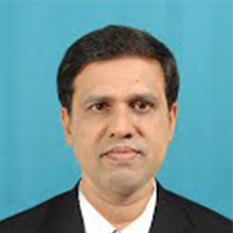
Dr. John Philip
View More

Dr. John Philip
IGCAR, Kalpakkam India
Working as Scientist and Head, CSTD at Indira Gandhi Centre for Atomic Research, Kalpakkam. Research fields are nanoscience, soft matter, corrosion science and technology etc. Obtained PhD from Indian Institute of Technology, Madras in 1992. Did post doc at CRPP-CNRS, France and at University of Hull, UK. Also a Professor at Homi Bhabha National Institute . Presently leading “Smart Materials section (SMART) and CSTD of Metallurgy and Materials Group. The important recognitions are - Science and Technology excellence award (2006), INS medal (2007), ISNT NDT National award (2009), MRSI medal (2010) and Ron Halmshaw award by British Institute of NDT in 2010, Distinguished Faculty Award of HBNI (2015) and Homi Bhabha S&T award (2016). Won research fellowships from Monbusho (Japan), CIES (France), Switzerland Research Fellowships, University of Exceter UK and University of Lund, Sweden. Six patents and over 220 publications in leading refereed international journals, with a total impact factor of > 450. H-index is 46 with over 8200 citations (highest among IGCAR researchers) . 11 Ph.D students are supervised and eight are pursuing their Ph.D. Other important responsibilities are editor-in-chief of Journal of Nanofluids (American scientific Publishers), editorial board member, Infrared Physics & Technology(Elsevier Netherland), IJMST, member board of studies(2014-17) Pondicherry University, reviewer for over 50 international journals and funding agencies, member research councils of CSIR-CGCRI, Kolkota, ARCI, Hyderabad, Scientific Advisory Committee Science & Heritage Research Initiative, DST, Ministry of Science and Technology, CSIR-AMPRI, Bhopal etc
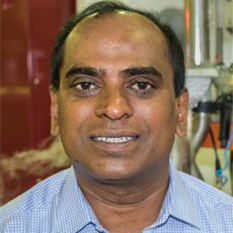
Dr. John V. Kennedy
View More

Dr. John V. Kennedy
GNS Science, Newzealand
Dr. John V. Kennedy is a Principal Scientist, Team Leader, Ion Beam Physics and Nanotechnology at National Isotope Centre, GNS Science. Dr. Kennedy is a materials scientist focussed on condensed matter research and nuclear instrumentation and has pursued wide range of research projects related to application of ion implantation and ion beam analysis technique for characterising thin films, nanotechnology, advanced materials, biology, environmental and agricultural samples. He is currently investigating metal and metal oxide nanoparticle growth and their structural, electrical, optical and magnetic properties, metallic nanoclusters and multiferroics nanostructures. He has published more than 200 journal papers demonstrating ion implantation into polymers, semiconductors, superconductors, nanostructures and 20 international patent applications. John’ interest in applying his materials science to industrial projects has led him to be leader in the Product Accelerator, Inductive Power Transfer and Titanium Technologies of New Zealand.
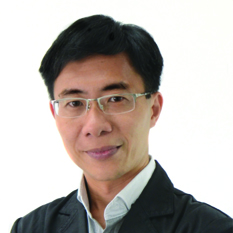
Dr. Johnson GOH Kuan Eng
View More

Dr. Johnson GOH Kuan Eng
NUS, Singapore
Dr. Johnson GOH Kuan Eng Bio works as Senior Scientist I / Research Councillor, Strategic Research Office, National University of Singapore, Singapore. His Research Areas are 2D Materials and Quantum Computation & Information. He is specialized in Nanofabrication, Molecular Beam Epitaxy, Delta-doping, Scanning Probe Microscopy, Ballistic Electron Emission Microscopy, Electronic Transport and Quantum Effect Measurements. He won several prestigious awards like Best Poster Award. Molecular Materials Meeting (M3) at Singapore at 2011, WMRIF Visiting Researcher Award at NIST, Gaithersburg, USA at 2009. He authored a book “Nikodem Tomczak and Kuan Eng Johnson Goh, Scanning Probe Microscopy, World Scientific: Singapore in 2011”. He has filed 4 International patents.
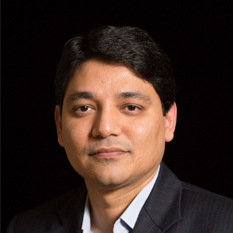
Dr. Kafil M. Razeeb
View More

Kafil M. Razeeb
University College Cork, Ireland
Dr. Kafil M. Razeeb is a Senior Staff Researcher leading the Advanced Energy Materials Group where his research is focused in the development of materials and micro devices for energy generation, storage, electrochemical sensing and thermal management of photonics integrated circuits. He received his MSc in Applied Physics and Electronics, from the University of Dhaka in 1999 and his PhD degree in Physics from University of Limerick in 2003. Dr. Razeeb is principal investigator and coordinator of several Enterprise Ireland (EI), Science Foundation Ireland (SFI) and European Union (EU) funded projects and Co-PI and Funded Investigator of Science Foundation Ireland research centres IPIC and Connect. In his professional career, He has been successful in sourcing substantial (€ 7 Million) research funding from the SFI, EI, EU Framework Programmes as well as corporate sector. Dr. Razeeb has supervised 41 Bachelors/Masters/PhD/Post-doctoral fellows from Materials Chemistry, Physics and Microelectronics discipline at Tyndall National Institute and at University College Cork. He is the author of 1 book, 10 book chapters and over 100 peer reviewed research papers. Dr. Razeeb is a member of The Electrochemical Society, Senior Member of IEEE and Chartered Physicist and Member of Institute of Physics.
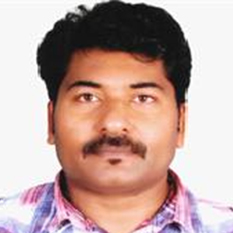
Dr. Kaliaperumal Selvaraj
View More

Dr. Kaliaperumal Selvaraj
CSIR-NCL, India
Dr. Kaliaperumal Selvaraj, joined as a scientist at the National Chemical Laboratory at Pune in 2002. His research area is Nano materials science for energy and environmental applications. His focus is on design of multifunctional nanoscopic materials for applications including catalysis, nanomedicine / theranostics, clean power production & storage and clean environment. He also uses Density Functional Theory based computational approaches to understand the structure-property correlations especially on host-guest interactions. He was a visiting researcher at ICG, a CNRS Laboratory at Montpellier, France (Prof. Jean Marie Devoiselle, Director, ICG and Dr. Sylvie Begu, ENSCM) between 2006 to 2008 under the ANR Research Program. He jointly commissioned and maintain a state of the art Powder XRD research facility with in-situ non-ambient experimental setup. Dr. Kaliaperumal Selvaraj, having masters degree in chemistry from the University Department of Madras University (1993), obtained Ph.D in Chemistry at the National Chemical Laboratory (1994). His Ph.D was on Materials Science under the mentoring of Dr. A. V. Ramaswamy. He was offered a full time faculty position at the University Department of Chemistry, Pune University where he taught Physical chemistry, Biophysical chemistry, Instrumental methods for chemical analysis including spectroscopy to post-graduates. During this period he visited the Netherlands (Prof Andre ten Elshof, MESA+, Univ. of Twente). Currently at the Nano and Computational Materials Lab, his team works on projects such as (i) nanoscopic modifications of 2D and 3D carbon materials for developing novel functional materials for clean energy and (ii) multifunctional nanosystems for biomedical applications and health such as medical diagnostics, targeted drug delivery, chemotherapy, photothermally controlled drug release and hyperthermia. His programs are largely supported by funds from CSIR through schemes such as EMPOWER and SERB DST etc., Research activities are disseminated through several international and national research articles and international patents.
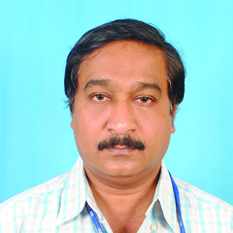
Dr. M. Kamruddin
View More

Dr. M. Kamruddin
IGCAR, Kalpakkam India
Dr. M Kamruddin is the head of Nanomaterials and Characterization Section in Surface & Nanoscience Division of Materials Science Group, IGCAR and professor, Homi bhabha National Institute. He is specialize in developing nanostructure materials for sensor applications, surface modifications for tribological applications and suitable methodologies to characterise the nanostructure materials using advanced scanning probe techniques, SEM and FIB.

Dr. Keiji Nagai
View More

Dr. Keiji Nagai
Tokyo Institute of Technology, Japan
Keiji Nagai is currently working as a Associate professor in Tokyo Institute of Technology Institute of Innovative Research, Japan. He is specialized in Photoenergy conversion materials, Organo photocatalyst, Laser plasma, Low density materials. Keiji completed his Ph.d from Science Waseda University in 1995. He worked as a researcher in the project entitle "Photofunction conversion material” in Kanagawa Academy of Science and Technology(KAST), Hashimoto during 1995-1998. The worked as Assistant Professor in Osaka University during 1998-2009.
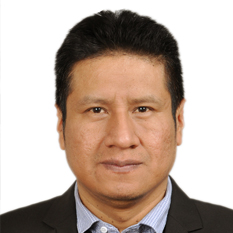
Dr. Luis De Los Santos Valladares
View More

Dr. Luis De Los Santos Valladares
Northeastern University, Shenyang, China.
Luis De Los Santos Valladares is professor in the Northeastern University, Shenyang and a Research Associate at the University of Cambridge (UK). He graduated and studied the Mastery in Physics at the University of San Marcos (Peru), PhD in Physics at the University of Cambridge (UK), Post Docs at the Tokyo Institute of Technology (Japan) and the University of Pernambuco (Brazil). He is a specialist in the preparation, characterization and applications of different functional materials, oxidation processes of metal surfaces, magnetic properties of metal oxides and characterization of soils and rocks. He has published more than fifty research articles, peer reviewed in different specialized journals, given talks at many conferences and Universities around the world and has evaluated many dissertations and projects. He has organized five international conferences in areas related with physics and materials science. Within the last two years he has attracted more than 3 million pounds from mining royalties to do research collaboration between the University of Cambridge and National Universities in Peru.
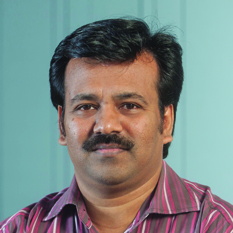
Dr. Mani Karthik
View More

Dr. Mani Karthik
ARCI, India
Dr. Mani Karthik is currently working as a Senior Scientist, Centre for Nanomaterials, International Advanced Research Centre for Powder Metallurgy and New Materials (ARCI), Hyderabad, India from Sep. 2016. He successfully completed his Ph.D. (Nov. 2005) in Chemistry at Department of Chemistry, Anna University, Chennai, Tamil Nadu, India. After his Ph.D., he joined as a Research Scientist (From Mar. 2005 to Mar. 2006) at Center for Functional Nanomaterials, Department of Chemistry, KAIST, Daejeon, South Korea. Then, he worked as an Adjunct Assistant Professor (From Feb. 2009 to July 2009) and Post-Doctoral Researcher (From Sep. 2006 to Jan. 2009) at Institute of Environmental Engineering, National Chiao Tung University (NCTU), Hsinchu, Taiwan. After three years his research activities in Taiwan, he joined as a Research Scientist (From April 2010 to Feb. 2011) at Department of Analytical Chemistry, University of Torino, Torino, Italy. He worked as an Associate Researcher (Permanent Position) and Postdoctoral researcher at Thermal Energy Storage Group, Energy Cooperative Research Centre, CIC ENERGIGUNE, Spain (Jan. 2012 - Aug. 2016). His research areas of specialisation include material science and nanotechnology, porous carbon materials, catalysis, photocatalysts, fine-chemical synthesis, air quality management and pollution control, solar energy harvesting, conversion & storage and supercapacitors. He has 43 peer reviewed journal articles, 1 book chapter and 7 international patents in his credit. He is currently serving as an International Editorial Board Member for Journal of Catalyst & Catalysis, and Journal of Environmental Nanotechnology, and peer reviewer for more than 25 international high impact factor journals. He has also served as Guest Editor for Materials Focus (Special Issue)-Journal of American Scientific Publishers (ASP). He delivered several invited talks and presented his research papers in several international conferences.
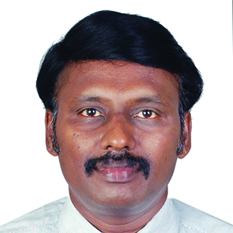
Dr. A. Manuel Stephan
View More

Dr. A. Manuel Stephan
CECRI, India
Dr. A. Manuel Stephan Works as Professor in CSIR – CECRI, Karaikudi, India. He completed his PhD (Physics) in Alagappa University, Karaikudi, Tamilnadu, India in 1997. He was JSPS Postdoctoral Researcher - Osaka National Research Institute, Osaka, Japan during April 2000- March 2001. He was also Postdoctoral Researcher - Department of Chemistry, The University of Tulsa, Tulsa, Oklahoma, USA during August 2001- January 2002. His area of Interests are Polymer Electrolytes, Lithium sulfur batteries. He bagged Most cited article award from European Polymer Journal ‘Review on Gel Polymer Electrolytes for Lithium Batteries’ 850 Citations.
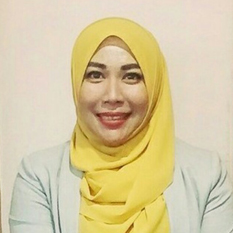
Dr. Marlia Mohd Hanafiah
View More

Dr. Marlia Mohd Hanafiah
University of Kebangsaan, Malaysia
Marlia Mohd Hanafiah is an Associate Professor at the Faculty of Science and Technology, Universiti Kebangsaan Malaysia (UKM). She is also a Head of Centre for Climate Change System, Institute of Climate Change, UKM. She received her Ph.D Degree in Life Cycle Assessment (LCA) from Radboud University Nijmegen, the Netherlands in 2013. She has served as a Guest Editor of several international journals and an Editor-in-Chief of Environment and Ecosystem Science (EES). She has supervised/co-supervised 50 masters and 18 bachelors theses and currently she supervises 22 PhD’s and 10 masters theses in the areas of LCA, wastewater treatment, green technology and sustainability. She is the coordinator of several postgraduate courses at her department. Her research projects focus on modelling potential environmental impacts from pollutant emissions in an LCA context and exploring potential bio-based and nanomaterials for treating wastewater towards sustainable water management practice. Dr. Marlia has published over 60 peer- reviewed papers, books, books chapters, technical reports and serves as peer reviewer for several high impact journals. As a project leader, she has received several international and national grants from various funding agencies with a total amount of more that RM 1.7 million. Since 2013, she has been involved in consulting and reviewing Criteria Document and Standard for companies, organizations and governments. She is currently conducting transdisciplinary research with a strong interest that integrates green technology and education to tackle fundamental community challenges, especially those related to sustainability.
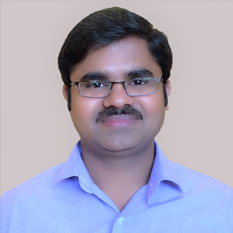
Dr. Murali Banavoth
View More

Dr. Murali Banavoth
University of Hyderabad, India
Dr. Murali Banavoth is currently an Assistant Professor at School of Chemistry, University of Hyderabad. After obtaining his Ph.D., from Indian Institute of Science, moved to King Abdullah University of Science and Technology (KAUST) at Solar Center as a postdoctoral associate and carried out pioneering work in the field of hybrid functional materials for solar harvesting. Dr. Banavoth’s contribution to the photovoltaic (Solar Cells) research is evident from his outstanding more than 50 publications in Nature, Advanced Materials, JACS, Angew. Chem., etc. are a few to name. His research interests are broadly classified as organic, inorganic, and hybrid solar cells and photovoltaics. Dr. Banavoth is the recipient of Telangana state-Parthibha Puraskar Award, Junior and Senior Research Fellowships from Council of Scientific and Industrial Research-New Delhi. He is also the recipient of several international and national awards such as Young Scientist Award from Indian Science Congress (ISCA), Young Scientist Award from International Society for Energy Environment and Sustainability (ISEES), Young Scientist Award from BRICS-2017, Young Scientist Award from Scientific Planet Society (SPS)-2018, Young Scientist Award from Telangana Academy of Sciences (TAS), Startup grant from University Grants Commission (UGC), Early Career Research Award (ECRA) from Department of Science and Technology (DST), NASi-Platinum Young Scientist Award etc for his remarkable contributions in the field of Solar Energy Research.
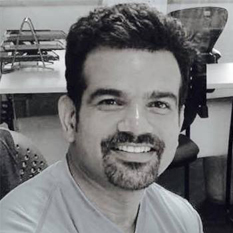
Dr. Nandanan Erathodiyil
View More

Dr. Nandanan Erathodiyil
A*STAR Institute of Bioengineering and Nanotechnology and the NanoBio Lab, Singapore
Nandanan Erathodiyil was born and raised in Kerala, a southern state in India. After receiving his M. Sc. degree in chemistry from the University of Calicut, he joined the National Chemical Laboratory, Pune, as a CSIR research fellow and received his Ph. D. degree (organic chemistry) in 1997 for the work on transition metal catalyzed asymmetric oxidations and reductions. He continued his postdoctoral research at the National Institutes of Health, USA, as an Alexander von Humboldt fellow at the Free University of Berlin, Germany and at the Lawrence Berkeley National Laboratory, USA. After an year industrial experience at Molecular Therapeutics, USA, he joined as a principal research scientist at the A*STAR Institute of Bioengineering and Nanotechnology and the NanoBio Lab, Singapore. Dr. Nandanan’s research is interdisciplinary in nature and his main interest focuses on how an organic chemist can solve the problems in biomedical and nanotechnology research. His research interests include the development of biomaterials, nanomaterials, nanocatalysis and green chemistry. He has authored over 45 research articles in peer reviewed international journals and delivered over 35 invited talks at international conferences. Dr. Nandanan has been recognized with a number of prestigious fellowships, including CSIR junior and senior research fellowships, India; NIH visiting fellowship, USA; DOE-LBNL postdoctoral fellowship, USA; and Alexander von Humboldt fellowship, Germany. He received outstanding mentor award for mentoring junior scientists, graduate, and undergraduate students. He is a career development advisor at A*STAR and is an active member of the American Chemical Society.
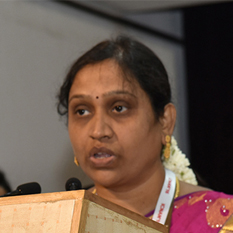
Dr. A. Nirmala Grace
View More

Dr. A. Nirmala Grace
Vellore Institute of Technology, India
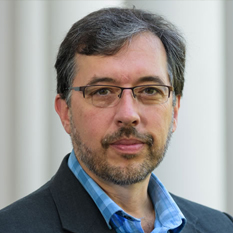
Dr. Norman J. Wagner
View More

Dr. Norman J. Wagner
University of Delaware, USA
Norman J. Wagner is an American engineer, currently the Robert L. Pigford Chair of Chemical Engineering at the University of Delaware. He gained a Bachelor degree at Carnegie Mellon University in 1984. He was awarded a Doctorate in 1988 at Princeton University and a Director's Postdoctoral Fellowship, Los Alamos National Laboratory in 1990. His research focuses on developing a fundamental understanding of the molecular and nanoscale structure and dynamics of complex materials, especially during flow and processing, which falls under the broader disciplines of rheology, nonequilibrium thermodynamics, complex fluids and soft matter. His goals include directing molecular and nanoscale self-assembly as a route to engineering novel materials. He is also pioneering new experimental methods for probing nanoscale material structure in collaboration with the National Institute of Standards and Technology (NIST), Center for Neutron Research and Institute Laue Langevin, (ILL) France. His research has broad application, is supported by the NSF, NASA, NIST, and industry, and includes collaborations around the globe. Translation to practice includes product engineering and entrepreneurial activities through STF Technologies LLC. Teaching interests include Design and Product Engineering, Mass and Heat Transport, Thermodynamics, Colloid and Interface Science and Scattering Methods for Characterizing Soft Matter. He was awarded the Bingham Medal in 2014 by the Society of Rheology.
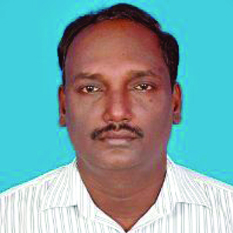
Dr. K. Pandian
View More

Dr. K. Pandian
University of Madras, India
Dr. K.Pandian works as Professor in University of Madras, India. He is Specialized in Nanotechnology, Surface Science, Catalysis & Polymer Science. His prestigious Achievements are First Controller of Examination in Thiruvalluvar University at Vellore-632 004, Estabilished Dept of Chemistry, University of Madras in P.G. Extension Centre at Vellore on 2000 and Scientist of the Year 2018 received from NESA foundation, New Delhi for Research achievement. He is a member of Indian Mass Spectroscopy Association, National Environmental science Academy - Life member and American Chemistry Society, USA. He is Vice Chairman for Madras Chapter for SAEST, Karaikudi.
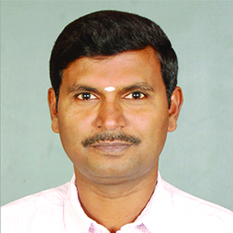
Dr. N. Ponpandian
View More

Dr. N. Ponpandian
Bharathiar University, India
N Ponpandian obtained his B. Sc. from Vivekananda College Agasteeswaram, , in 1992 and M. Sc. from Ayya Nadar Jamaki Ammal College, Sivakasi in 1995. He received his Ph.D. (Physics – Materials Science) in 2003 from University of Madras, Chennai. He Joined as a Research Associate in the Dept of Materials Engineering of Indian Institute of Science, Bangalore in August 2002. From May 2003 to February 2008 he served as a Visiting Scientist and Post-Doctoral Fellow in Free University of Berlin, University of Rostock in Germany and University of Nebraska, USA. After that, he has joined as a faculty in the Department of Nanoscience and Technology of Bharathiar University in February 2008. He has received Senior Scientist Award for Physical Sciences for the year 2016 by Science City, Government of Tamil Nadu. Presently, he is the Head of the department of Nanoscience and Technology of Bharathiar University since July 2015. He has published more than 150 papers in internationally well reputed journal and those are cited more than 4500 times. His area of research is experimental condensed matter physics – magnetic materials, nanomaterials and synchrotron radiation for X-ray absorption.
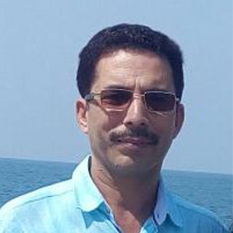
Dr. Pranab Goswami
View More

Dr. Pranab Goswami
IIT Guwahati, India
Pranab Goswami M.Sc. (G.U.), M.S. (BITS, Pilani), PhD (NEIST CSIR Jorhat), is currently a Professor in Bio Biosciences and Bioengineering, IIT Guwahati, India. His research achievements are synthesis of Biodegradable Nano-carrier for Targeted Drug delivery. DBT, N. Delhi Year 2007-2010 as a Co-Principal Investigator, Electrospun nanofiber scaffolds for hepatic tissue engineering. DBT, New Delhi, Year 2007-2010 as Co-Investigator. Enzymatic Biofuel Cell for Biomedical applications. DBT, New Delhi Year 2007-2009 as aPrincipal Investigator and Development of enzyme electrode for the construction of cholesterol biosensor. CSIR, India Year 2007-2011 as a Principal Investigator.
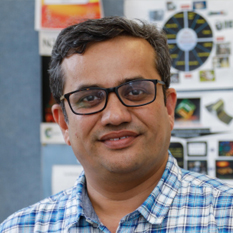
Dr. Prashant Sonar
View More

Dr. Prashant Sonar
Queensland University of Technology, Australia
Prashant Sonar performed his doctoral work under the supervision of Professor Müllen at Max- Planck Institute of Polymer Research, Mainz, Germany and was awarded his PhD in 2004 from Johannes-Gutenberg University in Mainz. Dr. Sonar moved to Swiss Federal Institute of Technology (ETH), Zurich, Switzerland for doing his postdoctoral research as with Professor Schlüter from 2004 till 2006. From August 2006 till 2014, he was working as a Research Scientist at Institute of Materials Research and Engineering (IMRE), Agency of Science, Technology and Research (A*STAR), Singapore. Dr. Sonar received prestigious Future Fellowship (2013) from the Australian Research Council and was appointed as Associate Professor in July 2014 at Queensland University of Technology (QUT), Brisbane, Australia. At QUT, he established Organic and Printed Electronic Research group. He was also appointed as Visiting Professor at School of Material Science and Engineering,Indian Institute of Technology, Kanpur from 29th November 2017 till 31st December 2017. He also holds adjunct Associate Professor position with Griffith University, Australia. Currently, he is serving as an Associate Editor of the journal Flexible and Printed Electronics (Institute of Physics, London) and recently elected as Fellow of Royal Chemical Society (FRSC).
Prof. Sonar is interested in design and synthesis of novel -functional materials (small molecules, oligomers, dendrimers, and polymers) for printed electronics, (OFETs, OLEDs, OPVs, OLETs, OPDs, and Sensors) bioelectronics and supramoleculecular electronic applications. Dr. Sonar delivered more than 36 invited and contributed talks at various international conferences and institutes. He has authored or co-authored 133 peer-reviewed research papers in international journals (H-index-38 according to Google Scholar with total citations 5500) and filed 11 patents and patent application in regional and international level. Recently his two patents licensed to the multinational US based company.
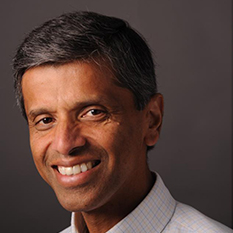
Dr. Prasanth V. Kamat
View More

Dr. Prasanth V. Kamat
University of Notre Dame, USA
Prashant V. Kamat is a Rev. John A. Zahm, C.S.C., Professor of Science in the Department of Chemistry and Biochemistry and Radiation Laboratory and Concurrent Professor in the Department of Chemical and Biomolecular Engineering. A native of Binaga, India, he earned the masters (1974) and doctoral degree (1979) in Physical Chemistry from the Bombay University, and carried out his postdoctoral research at Boston University (1979-1981) and University of Texas at Austin (1981-1983). He joined Notre Dame in 1983. Professor Kamat has for nearly three decades worked to build bridges between physical chemistry and material science by developing advanced nanomaterials for cleaner and more efficient light energy conversion. Professor Kamat’s research has made significant contributions to four areas: (1) Photoinduced catalytic processes using semiconductor and metal nanoparticles, nanostructures and nanocomposites, (2) Development of light energy harvesting assemblies (e.g., quantum dots, metal halide perovskites and inorganic-organic hybrid assemblies) for next generation solar cells, (3) Utilization of carbon nanostructures (SWCNT and graphene) as conducting scaffolds to collect and transport charge carriers in solar cells and fuel cells, and (4) Environmental remediation using advanced oxidation processes and chemical sensors.. He has directed DOE funded solar photochemistry research for the past 20 years. In addition to large multidisciplinary interdepartmental and research center programs, he has actively worked with industry-sponsored research. He has served on many national panels on nanotechnology and energy conversion processes. He has published more than 450 scientific papers that have been well received by the scientific community (52000+ citations). and has an h-index of 121. Science Watch of ISI included him among the Top 100 chemists of the decade 2000-2010 and included among Most Cited Chemists in 2014, 2015, 2016. In 2016, Kamat was named by the American Chemical Society as the Editor-in-Chief of new journal, ACS Energy Letters. Earlier, he served as a deputy editor of the Journal of Physical Chemistry Letters from 2010-2016. He is a member of the advisory board of scientific journals, Chemical Reviews,Proceedings of the Indian National Academy, J. Colloid & Interface Science, Research on Chemical Intermediates, Applied Electrochemistry and Interface. He was awarded Honda-Fujishima Lectureship award by the Japanese Photochemical Society in 2006, CRSI medal by the Chemical Research Society of India in 2011, and Langmuir Lectureship award in . He is a Fellow of the Electrochemical Society, AAAS, and the American Chemical Society (ACS). He was elected as a Pravasi Fellow of the Indian NationalScience Academy in 2015.
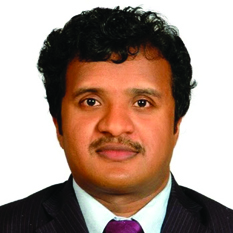
Dr. Pratap Kollu
View More

Dr. Pratap Kollu
University of Hyderabad, India
Dr. Pratap Kollu works as Assistant Professor with a demonstrated history of working in the higher education industry. Skilled in Magentic Sensors, Thin Films, Microfabrication, Materials Science, Spectroscopy, and Photolithography. Strong education professional with a PhD focused in Magnetic Sensors from Chungnam National University. His Research Areas includes, Magnetic sensors for health care, navigation and defense, Graphene – Magnetic nanocomposites for battery anode, Multiferroics, high frequency electronics and water purification materials and Piezoelectric materials and sensors. He has MEMBERSHIP in several prestigious organizations like Member of IEEE Magnetics society and Life Member of Magnetics society of India.
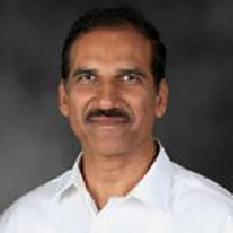
Dr. Rajendra Kumar Sharma
View More

Dr. Rajendra Kumar Sharma
SPEL, India
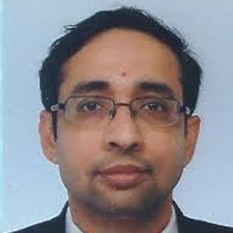
Dr. Raman Vedarajan
View More

Dr. Raman Vedarajan
ARCI, India
Dr. Raman Vedarajan works in Centre for fuel cell technology, ARCI, India. He worked as Professor (Assistant) in Japan Advanced Institute of Science and Technology, School of Materials science, Komatsu, Japan. His area of Research are Solid State Electrochemistry, Energy Materials, Organic-inorganic hybrid Materials Chemistry, Corrosion, Surface Modification, Hydrogen Generation, Electrochemistry, Inorganic Chemistry and Hydrogen Generation. He is a scientific member of American Chemical Society, Electrochemical Society, Society for Polymer Science Japan and Chemical Society of Japan. He has 7 Japanese patents, 1 US patent and 1 European patent filed.
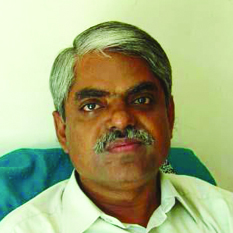
Dr. R. Ramaraj
View More

Dr. R. Ramaraj
Madurai Kamaraj University, India
Dr. R. Ramaraj works on Photoelectrochemistry and Photoelectrocatalysis - Chemically Modified Electrodes - Artificial Photosynthesis and Solar Energy Conversion-Nanomaterials and their Applications, Catalysis and Sensors. He won several prestigious awards like Homi J. Bhabha Award for Research in Applied Sciences in 2000 from University Grants Commission (UGC), Chemical Research Society of India (CRSI) Medal for Research in 2000 from Chemical Research Society of India, Bangalore, Ajit Memorial Lecture Award of IACS in 1993 from Indian Association for Cultivation of Science (IACS), Calcutta, Tamil Nadu Scientist Award (TANSA Award) for Research in 1998 from Tamil Nadu State Council for Science and Technology, Chennai, ERUDITE Scholar in 2011 from Govt. of Kerala & Kerala State Higher Education Council (KSHEC), M.G. University, Kottayam. He published a total of 135 papers in prestigious journals. He also authored 3 books. He has membership from prestigious organizations like FASc., Fellow of Academy of Sciences, Indian Academy of Sciences, Bangalore, FNASc., Fellow, National Academy of Sciences,National Academy of Sciences, Allahabad, FTNASc., Fellow, Tamil Nadu Academy of Sciences,Chennai, Member, National Committee of IUPAC (INSA-ICSU), Indian National Science Academy, New Delhi, (2012-2015) and Member, National Science Education Panel, Indian Academy of Sciences (2010-2015).
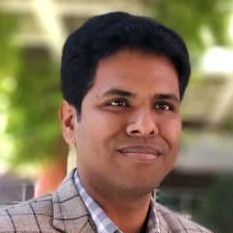
Dr. Ramendra Sundar Dey
View More

Dr. Ramendra Sundar Dey
INST, India
Dr. Ramendra Sundar Dey is a Scientist at Institute of Nano Science and Technology, Mohali, India. Prior, he was a Hans C. Ørsted postdoc fellow at Technical University of Denmark (DTU), Denmark. He received Ph.D. in Chemistry at 2013 from Indian Institute of Technology (IIT) Kharagpur, India. Over past 6 years he is involved in research in the field of electroanalytical chemistry in nanotechnology. His current research is focused on the architecture and engineering of nanomaterials for advanced energy storage technology and non-novel metal catalyst for hybrid energy systems. Dr. Dey has published more than 25 research articles, books and filed one patent. He has been honored with number of prestigious National and International awards. Recently, he has been honored for Journal of Materials Chemistry A Emerging Investigator and published their article under the themed issue highlighting 2019’s rising stars of materials.
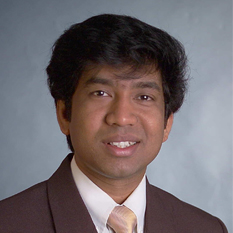
Dr. Ravi Kumar N V
View More

Dr. Ravi Kumar N V
IIT Chennai, India
Dr. Ravi Kumar obtained his doctorate in natural sciences from the Max Planck Institute for Metals Research Germany in 2004. Subsequently, he continued in the same institute as a postdoctoral researcher and guest scientist. After 6 years, he moved to the Institute for Shock Physics in Pullman, USA and worked on the dynamic response of bulk metallic glasses. In 2007, he joined to Dept of Metallurgical and Materials Engg., at IIT Madras as an Asst. Professor and currently working as a professor in the same department. As the head of the Central XRD Laboratory in IIT Madras, he doing collaborative projects and consultancy works with industries and universities in India and abroad. He is a visiting Professor of many foreign Universities. He has been a recipient of many awards/honors like, Institute Research and Development Award (IRDA) from IIT Madras on 2015, Certificate of Distinction for excellence in teaching from Hof University of Applied Sciences, Germany in 2013, Young Faculty Recognition Award from IIT Madras in 2012, Institution of Engineers Young Engineers Award in 2010, Young Scientist Award from the Indian Ceramic Society in 2008. He has published more than 60 peer-reviewed international papers and delivered several prestigious invited lectures in India, Europe and US. He is also a member of the faculty council of the IIT Madras research park and takes interest to encourage young engineers to become entrepreneurs. Prof. Ravi Kumar has executed several sponsored projects funded by various agencies of the Govt of India and currently has 10 crores of rupees projects as PI and Co-PI.
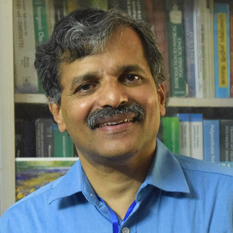
Dr. Sabu Thomas
View More

Dr. Sabu Thomas
Mahatma Gandhi University, India
Prof (Dr.) Sabu Thomas is the professor in charge of Vice Chancellor of Mahatma Gandhi University, Kottayam, Kerala, India. He is also the founder Director of International and Inter University Centre for Nanoscience and Nontechnology of the same University. A prolific author and editor, Prof Thomas has (co-)authored around 900 papers in international peer-reviewed journals in the area of Polymer Science and nanotechnology, has 5 patents to his credit, and edited 73 books. His research group focuses on specialised areas of polymers and has extensive collaborative exchange programs with various industries and institutions all over the world. He is in the top list of most productive researchers in India. The H-index of Prof. Thomas is 81. He has been awarded MRSI, CRSI, and Nanotech Medals. Prof Thomas has been conferred Honoris Causa DSc from University of South Brittany, France and University of Lorraine, France.
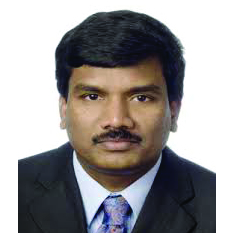
Dr. S. Sakthivel
View More

Dr. S. Sakthivel
ARCI, India
Dr. Shanmugasundaram Sakthivel works as Scientist-E and Team Leader in Centre for Solar Energy Materials, International Advanced Research centre for powder Metallurgy and new materials (ARCI), India. His Current research area includes Nano Functional coatings for solar & optical applications: Selective absorber, Antireflective & Dust repellent coatings, Sensitised carbon nano clusters for PV & Self-cleaning applications and Synthesis of different metal / metal oxide nano materials for PV and CSP applications. He won several prestigious awards like Bharath Jyoti Award in 2015 from India International Friendship Society, Glory of India Gold Medal in 2015 from International Institute of Success Awareness, DAAD research award in June 1999, from German Academic Exchange Service, Bonn, Germany and Brain-fellowship award in October 2006, from Korean Science and Technology, Korea. He is a member of several organizations like Member of International Solar Energy Society (ISES), Member of International material research society (MRS) and Member of material research society, India (MRS). He has 32 Publications, 26 Patents (9 Ind. Patents +10 other countries+ 3 US + 2 WO+ 2 European).
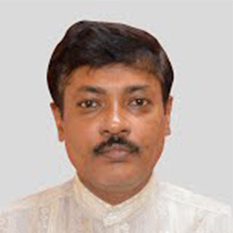
Dr. Sandip Kumar Dhara
View More

Dr. Sandip Kumar Dhara
IGCAR, India
SANDIP KUMAR DHARA works as Associate Professor in IGCAR, India. His Research areas are Nanoscience and Nanotechnology, Optoelectronics, Thin film, Raman and Photoluminescence Spectroscopy. He won several prestigious awards like DAE SRC Outstanding Researcher Award in 2012, DAE Group Schievement Award in 2008, Mentor for DST INSPIRE Initiatives in 2009, DAE-CSR-UGC Collaborative Programme in 2012 and Indo-South Africa Collaborative Programme in 2011.
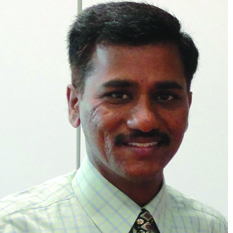
Dr. P. Saravanan
View More

Dr. P. Saravanan
DMRL, India
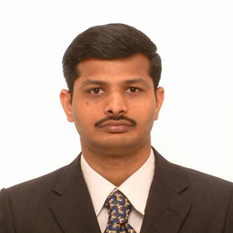
Dr. M. Sathish
View More

Dr. M. Sathish
CECRI, India
Dr. M. Sathish works as Scientist, CSIR-CECRI, Karaikudi, Tamilnadu, India. He completed his JSPS Post-doctoral Research at Institute of Multidisciplinary for Advance Materials, Tohoku University, Sendai, Japan. He did his Ph. D. (Chemistry) in 2006 at Indian Institute of Technology (IIT) Madras. He has Memberships in several organizations like Life Member of Catalysis Society of India (CSI), The Society for Advancement of Electrochemical Science and Technology (SAEST – Life member), Materials Research society of Singapore (MRS-S), Electrochemical Society (ECS), International Society of Electrochemistry (ISE) and Electrochemical Society of Japan (ECS-J). His area of Research includes, Nanomaterials, Photo/Electrochemical Energy Storage/Conversion and Environment remediation, Photocatalytic and electrochemical processes for generation of hydrogen and decontamination of water, Development of fullerene/fullerene based nanomaterials for energy and environmental applications and Development of functional graphene-based electrodes for supercapacitor and advanced Li-ion battery. He received JSPS post-doctoral research fellowship (2010), Awarded by Japan Society for the Promotion of Science.
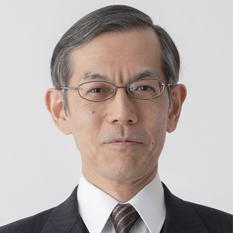
Dr. Satoshi Watanabe
View More

Dr. Satoshi Watanabe
University of Tokyo, Japan
Satoshi Watanabe is a professor in Department of Materials Engineering, School of Engineering, The University of Tokyo. He received his B.S. degree in Physics in 1984, M.S. degree in Physics in 1986, and his Ph.D. degree in Physics in 1989 from the University of Tokyo. He worked on the Aono Atomcraft Project at the Research Development Corporation of Japan (now Japan Science and Technology Agency) from 1989 to 1994 and at the Advanced Research Laboratory, Hitachi Ltd. from 1994 to 1997. Afterwards, he joined the University of Tokyo in 1997 as an associate professor and became a professor in 2004. He also served as the editor-in-chief of e-Journal of Surface Science and Nanotechnology from 2009 to 2018, and Director of Center for International Affairs, School of Engineering, The University of Tokyo from 2015 to 2018.
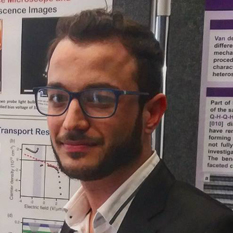
Mr. Servet Ozdemir
View More

Mr. Servet Ozdemir
University of Manchester, UK
Mr. Servet Ozdemir graduated from the University of Warwick with a Master of Physics degree in 2016. Shortly after my graduation I enrolled at the University of Manchester as a PhD student as part of the prestigious Graphene NOWNANO Centre of Doctoral Training. Following my initial training I have joined the Mesoscopic Physics Laboratory within the Condensed Matter Physics group. I am currently researching graphene and related van der Waals heterostructures under the supervision of Prof. Konstantin Novoselov and Dr. Artem Mishchenko.
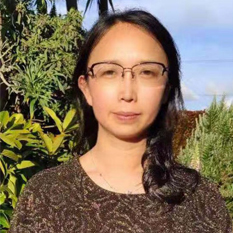
Dr. Sherry Xu
View More

Dr. Sherry Xu
The University of Auckland, New Zealand
Dr Ying Xu (Sherry) is a research fellow working with Professor Peng Cao at UOA. Her research focus on the synthesis of nanoparticles, quantum dots and nanowires for applications ranging from biomedical imaging to metal 3D-printing. She did her Master and PhD in the Department of Chemistry, Victoria University of Wellington, NZ, after which she was a scientist and senior scientist for seven years at a High-Tech company, NZ, focusing on the development of nanomaterials for commercial applications. She graduated with Bachelor of Engineering in chemical and process engineering at Nanjing University of Technology, China.
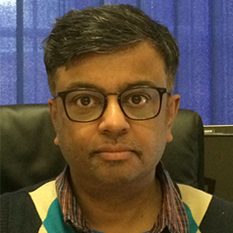
Dr. Somnath Bhattacharyya
View More

Dr. Somnath Bhattacharyya
University of the Witwatersrand, South Africa
Professor Somnath Bhattacharyya works as Professor in University of Witwatersrand, South Africa. His research interests include, Quantum transport properties and Nano-electronics: Nano-Carbon based quantum devices for information science. His works include Low-dimensional Carbon super lattice & fast Nano-electronic devices, Carbon nanotubes & semiconductor nanowires: Optoelectronics, Quantum Transport properties of Nano-crystalline diamond and Electronic properties of amorphous low-dimensional carbon thin films.
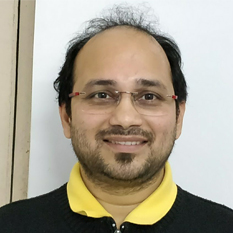
Dr. Subhash Thota
View More

Dr. Subhash Thota
IIT Guwahati, India
Dr. Subhash Thota is an Experimental Condensed Matter Physicist currently working as Associate Professor at Department of Physics of IIT Guwahati. He obtained his Ph.D. in the field of “Magnetic Nanostructures” from “Materials Science Programme” of Indian Institute of Technology Kanpur (IIT Kanpur) in 2009. Subsequently, he spent two years as a Postdoctoral Research fellow at CNRS laboratory CRISMAT Caen, France where he working on "Magnetic-Superlattices”. He joined IIT Guwahati in 2011 as Assistant Professor. He published more than 100 peer reviewed international Journal papers and International and national conferences. Dr. Subhash obtained M.Sc[Tech], Engineering Physics from National Institute of technology Warangal (NIT Warangal) 2003. For more details see the webpage http://iitg.ac.in/subhasht
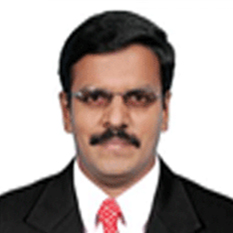
Dr. B. Subramanian
View More

Dr. B. Subramanian
CECRI, India
Dr. B. Subramanian, Is a Principal Scientist in Electrochemical Materials Science Division, CSIR- Central Electrochemical Research Institute, Karaikudi. since 04-02-2002. His Research Interest involves Current research interests include Bio- Surface Engineering of implantable substrates for artificial organs with hard coatings, oxide reinforced ceramics and thin film metallic glasses using physical vapor deposition processes like sputtering, electron beam evaporation and pulsed laser deposition. Also involved in the preparation and characterization of semiconducting thin film electrodes for dye sensitized solar cells. He Availed Bilateral Exchange Program for the year 2010-11 at Osaka University, Japan. He is the Recipient of BRAINPOOL Fellowship, South Korea for the year of 2010.
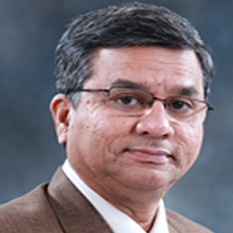
Dr. Suddhasatwa Basu
View More

Dr. Suddhasatwa Basu
IIMT, India
Prof. Suddhasatwa Basu completed Ph.D. in Chemical Engineering from Indian Institute of Science, Bangalore (MS/Ph.D) after obtaining B.Tech in Chemical Engineering from Calcutta University. He worked for five years as a Research Fellow and as a visiting faculty at the University of Alberta, Edmonton. Prior to taking over as the Director of CSIR-IMMT, he was Associate Dean Research & Development, Indian Institute of Technology (IIT) Delhi and former Head of Chemical Engineering Department, IIT Delhi. He has vast work experience on development of Energy Materials and its application to energy conversion and storage devices, e.g., Fuel Cells, Supercapacitor and Battery, Electrolyser for Hydrogen generation by Water Splitting and CO2 Reduction to Organics. He worked on Oil-Sands Extraction in Alberta, Canada specializing in slurry transport and separation of oil and sands. Earlier he worked on Colloids and Interfacial Phenomena particularly on De-emulsification and Removal Dye from waste water. He has published in high impact journals (143, H-index 29), patents (5) and transferred technologies (2) to various industries. He has been awarded with Fellow of National Academy of Science of India, Herdillia Award - Excellence in Basic Research in Chemical Engineering, Dr A. V. Rama Rao Foundation's Research Award in Chemical Engineering/Technology. He is Editor/Associate Editor/Editorial Board member of several international journals published by Willey, Springer, Elsevier and ACS.
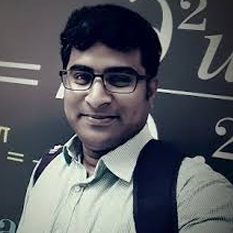
Dr. Sudhagar Pitchaimuthu
View More

Dr. Sudhagar Pitchaimuthu
Swansea University, UK
Dr. Sudhagar Pitchaimuthu, is Ser Cymru-II Rising Start Fellow at SPECIFIC, College of Engineering, Swansea University (SU). He is leading "Multifunctional Photocatalyst and Coating" research group at SU. His research expertise is ‘nanomaterial synthesis and coatings’ towards constructing low-cost solar energy driven photoelectrochemical system/devices. Mainly his group focuses on utilising the abundance, sustainable solar energy for multifunctional applications such as energy conversion devices (solar cells and solar fuel cells), environmental clean-up (photocatalytic water treatment, air purification) and biosensors. His current research interest is to develop a) semiconductor thin film based solar light photoabsorbers (metal oxide, metal chalcogenides), b) Quantum dot films/coating, c) less expensive Pt-free water oxidation/reduction catalyst. His research is jointly funded by Welsh Government and European Commission through European Regional Development Fund (ERDF) under Sêr Cymru II-Rising Star Fellowship scheme (£ 1 M) over five years (2017-2022). Dr. Sudhagar graduated from Physics discipline, Bharathiar University, India in 2009. He was working as Research Assistant Professor during 2009-2013 under Prof. Yong Soo Kang at Center for Next Generation Dye-sensitized Solar Cells in Hanyang University, South Korea. Concurrently, he has been serving as visiting scientist to Department of Applied Physics, University of Jaume I, Spain from 2011. He was a recipient of JSPS award from Japan Society for the Promotion of Science, Japan in 2013. Sudhagar has published more than 70 articles in peer-reviewed journals (citations: 1904, h index: 27), and contributed 5 book chapters. He also chaired, and co-organised 5 international conferences and workshops.

Dr. V. Uma
View More

Dr. V. Uma
Mount Carmel College, India
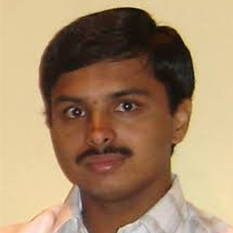
Dr. Umananda M. Bhatta
View More

Dr. Umananda M. Bhatta
Jyothy Institute of Technology, India
Dr. Umanand Bhatta works as Associate Professor in Jyothy Institute of Techonology. He received his PhD (Physics, Surfaces and Interface of thin films) from Homi Bhabha National Institute (IOP, Bhubaneswar). He is Principal Investigator for Young Scientist DST project, titled, “Structural and chemical properties of interfaces of Si based metal/metal oxide thin films for solar cell applications”. He is also Principal Investigator for “In-situ TEM study of nucleation and growth of embedded Ge nanostructures in SiO2 and Si3N4 matrice. He has 46 Publications in International journals, 3 Publications National journals. His Number of citations (16.03.2018) 687 (h index 15, i10 index 22) ci. 360 (2016) 1003 Impact factor is 3.150. He is life member of several organizations such as, 1. Electron Microscopy Society of India, Life member, 2. Catalytic Society of India, Life member and 3. Materials Research Society of India, Life member
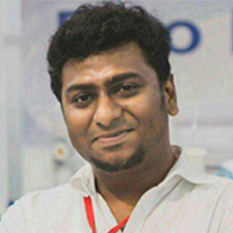
Dr. Vinoth Kumar
View More

Dr. Vinoth Kumar
Kaohsiung Medical University, Taiwan
Vinoth Kumar received his Bachelor degree in Chemical Sciences from PSG College, Bharathiyar University (2005), and Master degree in Analytical Chemistry from Department of Analytical Chemistry, University of Madras (2007), India. In 2011, he received his Doctorate (Ph.D.) in Analytical Chemistry under the supervision of Professor Jen-Fon Jen in Department of Chemistry, National Chung-Hsing University, Taiwan. And then, he continued his academic career as a post-doctoral researcher in the same laboratory for two years (2011~13) to work under the projects on the developments of nanomaterials for green analytical technologies. In late 2013, he started his industrial career in the Formosa Laboratories Inc., (a reputed API pharmaceutical company in Taiwan) to work as an analytical R&D department team supervisor-in-charge of the team responsible for completion of GLP Quality Control and Analytical R&D activities of polymer-based API drugs products. Later on, he moved to work as Technical Manager and Quality Assurance In-charge (2014~15) in Food Testing Laboratory, ChiMei Inspection Tech. Ltd., (Chimei Group, Taiwan), and responsible for lab analyzes of food and nutraceutical products samples ensuring compliance with ISO17025 and FDA. In the meantime, Dr. Vinoth Kumar was also received his second Master degree in Business Administration (2013~2016), specialization in marketing and technology management from Asia University, Taiwan. In 2015, Dr. Vinoth Kumar started his academic career as assistant professor in the Department of Cosmetic Sciences at Providence University, Taiwan and his lab research focused on cosmetic products safety testing and toxicity analysis. In late 2016, Dr. Vinoth Kumar moved to Department of Medicinal and Applied Chemistry, Kaohsiung Medical University, Taiwan as an Assistant Professor of Analytical Chemistry. In 2017, he was also appointed as a Core Research PI/Faculty in Research Center for Environmental Medicine, Kaohsiung Medical University, Taiwan. His research and teaching interests are mainly focused on nanomaterials, sample preparations, green analytical methodologies, mass spectrometric analysis, and analytical method developments for clinical, food, drugs, and environmental analysis and monitoring. Recently, he is also works in the area of human biomonitoring and newborn screening research projects. He was authored and co-authored for more than 40 SCI publications and one book chapter, more than 40 international and national conference presentations and ten invited keynote speaker lectures at reputed international conferences. Currently, he is one of the editorial board members of Ecronicon Chemistry Journals and, also being Peer Reviewer to several reputed scientific journals in the fields of nanomaterials and analytical chemistry.
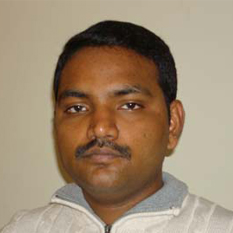
Dr. V. Vishnukanthan
View More

Dr. V. Vishnukanthan
University of Oslo, Norway
Dr. Vishninathan Venkatachalapathy works as Researcher - Centre for Materials Science and Nanotechnology Physics. His major Projects are Methodology for Interface and Defect Assessment in Semiconductors (MIDAS) and Polarization PhotoVoltaics (P2V). His Research groups focuses on Light and Electricity from Novel Semiconductors (LENS) / The Semiconductor Physics Group
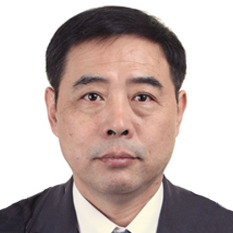
Dr. Wei Pan
View More

Dr. Wei Pan
Tsinghua University, China
Wei Pan is a professor and director of the State Key Lab of New Ceramics and Fine Processing at Tsinghua University, China. Pan has published more than 170 papers on the journals of Phys. Rev. Lett., Phys. Rew. B, Appl. Phys. Lett., Adv. Mater., Chem. Mater., J. Am. Ceram. Soc., Acta Mater. etc. Pan is a member of the standing-committee of the Chinese Ceramic Society and member of the editorial board of several international journals. He is also the Fellow of the School of Engineering at the University of Tokyo.
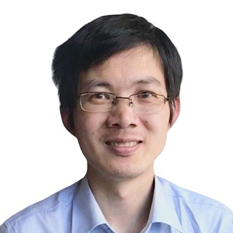
Dr. Weiping Wu
View More

Dr. Weiping Wu
City University of London, UK
Dr Weiping Wu is the George Daniels Lecturer in the Electrical and Electronic Department at City, University of London. Since 2010, he has been one of the early members of Cambridge Graphene Center at University of Cambridge, where he was part of the team initiated the €1 billion EU graphene flagship project and worked on 2D materials with various academic collaborators and industrial companies. In 2013, he was appointed as a Research Fellow in the Optoelectronics Research Centre (ORC), University of Southampton, the world’s leading institute for photonics research. Dr Wu has published more than 50 papers with a total citation over 3500 and an h-index of 29. He has been recognized as the finalist for the TechWorks 2018 Award, the International Union of Pure and Applied Chemistry (IUPAC) Young Observer for IUPAC 47th Congress, 50th General Assembly and Centenary Celebration. Dr Wu services as the Chairman of the Society of Chemical Industry (SCI)'s Chinese UK Group, the committee members of The Optical Society (OSA) London Chapter, SCI Materials Group and SCI London Regional Group. He is currently leading research projects in the areas of materials, energy and environment, funded by Innovate UK, UKRI and Research England.